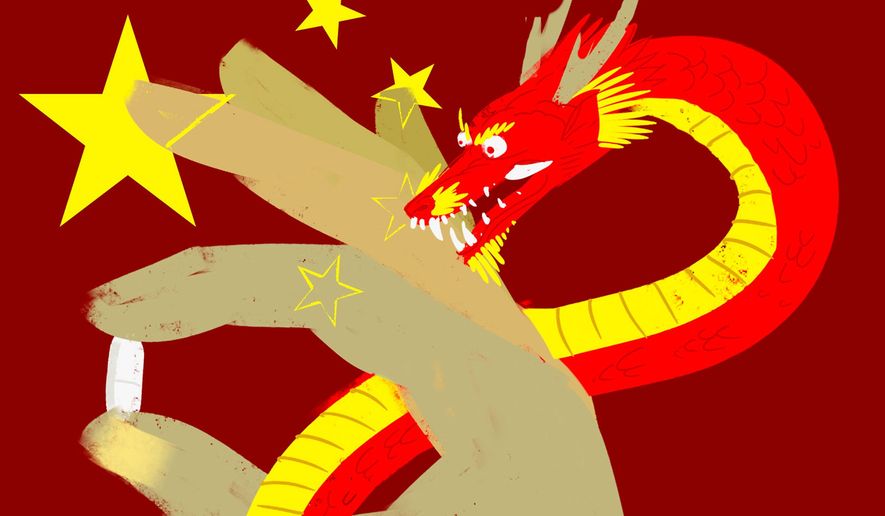OPINION:
China is pursuing a multifaceted plan to reshape the international order, advancing its national interests at America’s expense.
It has been using conventional diplomatic and economic tools and its military buildup to challenge the United States. China also undertakes malign influence operations through social media platforms such as TikTok. China has also been targeting Americans by facilitating the free flow of illicit drugs to substance users in North America, exporting fentanyl precursors to drug cartels in Mexico that mass-produce opioid tablets for export to the U.S.
Fentanyl is a powerful synthetic opioid similar to morphine that can be up to 100 times more potent. In its prescription form, fentanyl is a painkiller used by doctors after surgery. On the unregulated black market, fentanyl and synthetic opioids are major contributors to drug overdoses in the U.S. More than 90,000 Americans die each year from fentanyl-related drug overdoses.
The supply chain originates in China, where criminal groups called “triads” are involved at every stage of fentanyl production and distribution. Chinese triads are full-service drug dealers. They also profit at the back end by laundering money for Mexican cartels. The story often starts in Guangdong province in southeastern China, a good location for the production and trafficking of illegal goods and services because of its proximity to the financial and transport hubs of Hong Kong and Macao.
The Drug Enforcement Administration reports that Guangdong chemical factories sell fentanyl precursors to Mexico’s Sinaloa cartel, the Jalisco cartel, and their affiliates. From Guangdong, the precursors are smuggled to laboratories in northern Mexico that mass-produce fentanyl tablets that are smuggled to the United States.
Triads have existed for centuries, operating domestically and cooperating with Western criminal networks. Triads were involved in heroin production that addicted millions of Chinese and led to the Boxer Rebellion in 1900, which sought to eliminate Western involvement in China’s opium trade. Over more than a century, triads have developed well-established networks skilled at shifting money overseas via offshore banking and finance. The funds are ultimately returned to China, where they are used for the local production of illicit material.
Money laundering by the triads uses quasi-legitimate real estate development, construction and financial companies. In one method, triad companies send drug funds to offshore bank accounts and use these deposits to secure mortgages for purchasing and developing property.
Another method of money laundering involves falsified contracts used to make drug cash look like legitimate real estate wealth. The buyers pay artificially high prices for property, but a much lower actual price is paid to a triad-linked seller.
Casinos controlled by triads also play a role in money laundering. High-roller tables in Macao’s casinos cash out chips, with the proceeds used to buy global real estate and other corporate assets. Ill-gotten gains capitalize hedge funds in the U.S., which acquire assets in the free market. Investment banks and money transfer businesses are adept at shifting money to and from China.
The business is highly lucrative. Mexican cartels buy fentanyl precursors as well as fentanyl powder at a discount from Chinese suppliers. The triads keep the cost of precursors deliberately low to drive addiction and higher profits. It costs the cartels as little as 10 cents to produce a fentanyl-laced fake prescription pill that is sold in the U.S. for $10 to $30.
Efforts to interdict the supply chain have been ineffective. Mexican President Armando Manuel Lopez Obrador declared his policy toward drug cartels would be “hugs, not bullets.” He asserts that Mexico does not produce or consume fentanyl, blaming the crisis on “social decay” in American society. “We deeply lament what’s happening in the United States — but why don’t they fight the problem … and more importantly, why don’t they take care of their youth?”
After denying that precursors were coming to Mexico from China, Mr. Lopez Obrador recently conceded to a U.S. congressional delegation that he would speak to the Chinese. Little cooperation exists between U.S., Mexican and Chinese law enforcement to control the drug trade.
His point is well taken. The U.S. has been ineffective at addressing the demand side of the opioid crisis by curtailing fentanyl use in North America. If anything, fentanyl use is on the rise.
Mexican cartels are merely middlemen in a drug trade controlled by China. Focusing on the supply side should prioritize the Chinese triads. Are drug sales the result of a freewheeling business environment in China, do the triads operate in cahoots with Chinese officials, or is the business simply too lucrative to control? China is a highly controlled society where nothing happens on this scale without the knowledge of the Chinese Communist Party. Chinese officials turn a blind eye to the trafficking of opioids either because they profit from the drug trade or are complicit in a Chinese conspiracy to addict American youth.
The CCP keeps a tight leash on all aspects of China’s centrally planned economy. Fostering drug addiction and supplying users in the U.S. represents a new front in China’s superpower competition with the U.S. Making fentanyl users aware of the national security dimension to fentanyl trade could dissuade its use.
• David L. Phillips is a former U.S. official who currently directs the Program on Peacebuilding and Rights at Columbia University’s Institute for the Study of Human Rights.




Please read our comment policy before commenting.